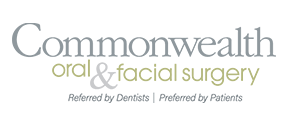At Commonwealth Oral & Facial Surgery, we realize that having any surgery can be stressful. Our desire is to have your post-operative course progress as smoothly as possible. These instructions provide some general guidelines with regards to post-operative care; your doctor may give you additional instructions as well. Thank you for choosing Commonwealth Oral & Facial Surgery.
After a Biopsy
Try not to disturb the area where your Biopsy was performed. To avoid irritation, keep your tongue away from the surgical site. You may have stitches; don’t be alarmed if they loosen or fall out before your post op visit.
Pathology results from a biopsy may take one to two weeks. Your doctor will inform you of your results. This is usually done at the time of your follow up appointment.
Bleeding
Some minor bleeding may occur after the procedure. This can last up to 24 hours. If bleeding is rapid and doesn’t slow down when pressure is applied it is best to call the office to speak with a Surgical Assistant for further instructions.
Swelling
Swelling can be a normal occurrence after surgery. In some instances swelling can be worse or peak on the third to fourth day after surgery. Should the swelling increase beyond this time period or be accompanied by severe pain or an elevated temperature, then please notify your doctor. If applicable, apply an ice pack to the outside of the face corresponding to the surgical site. Place the ice pack for 20 minutes at a time then rest for 20 minutes. Please apply ice packs for 48 hours starting the day of surgery. If the biopsy was taken from the tongue or roof of mouth then direct application ice chips will be most beneficial.
Pain Medications
You may have been given prescriptions for one or more pain medications to help manage post operative discomfort following your surgery. However, in some cases moderate discomfort can be controlled with Tylenol or an anti-infl ammatory medication (Advil/Motrin/Ibuprofen; Aleve/Naprosyn; Etodolac). Anti-infl ammatory medications can be alternated with a narcotic medication in most cases. Take these and all medications as prescribed and in the manner indicated by your doctor. It is a good idea to begin taking your pain medications while you are still numb.
While taking narcotic pain medications, do not drink alcoholic beverages, drive, or operate any machinery for 24 hours after the last dose of narcotic pain medicine. Some patients experience nausea and or vomiting as a result of narcotic pain medications. Please be sure to eat at least 30 minutes before taking your pain medication because this could reduce your risk of nausea. If you have a persistent problem with nausea or vomiting, please notify your doctor.
Antibiotics
If you have been placed on antibiotics, take them as directed. If you have an unfavorable reaction such as a rash, please discontinue the medication and call the office for further instructions.
Oral Hygiene
Mouth cleanliness is essential to good healing. Start rinsing 24 hours after your surgery. Rinse with warm salt water (1/2 teaspoon of salt to an 8 oz cup of warm water) three to four times a day. Use the salt water rinse in addition to any other rinses prescribed by your doctor. You may begin to brush your teeth 24 hours after surgery, and be gentle in the region(s) of the surgery.
Diet
Drink plenty of fluids; however avoid hot/steamy hot foods and liquids. Cool soft food and liquids should be eaten on the day of surgery. You may return to a normal diet, as tolerated, beginning the day after surgery but avoid crunchy food (popcorn, pretzels, and potato chips) for a week after surgery, as these could become lodged and irritate the surgical area.
Activities
Risk of falling: If you have been given sedation and/or narcotic medication there is a chance you may become light headed/dizzy. Extra caution must be used to prevent falling.
Resume normal activities a day or so after surgery, or as directed by doctor. Please keep physical activities to a minimum immediately following surgery.
Avoid smoking for as long as possible following surgery. The use of tobacco products slows down the healing process and may lead to developing other complications. We strongly recommend one full week.

